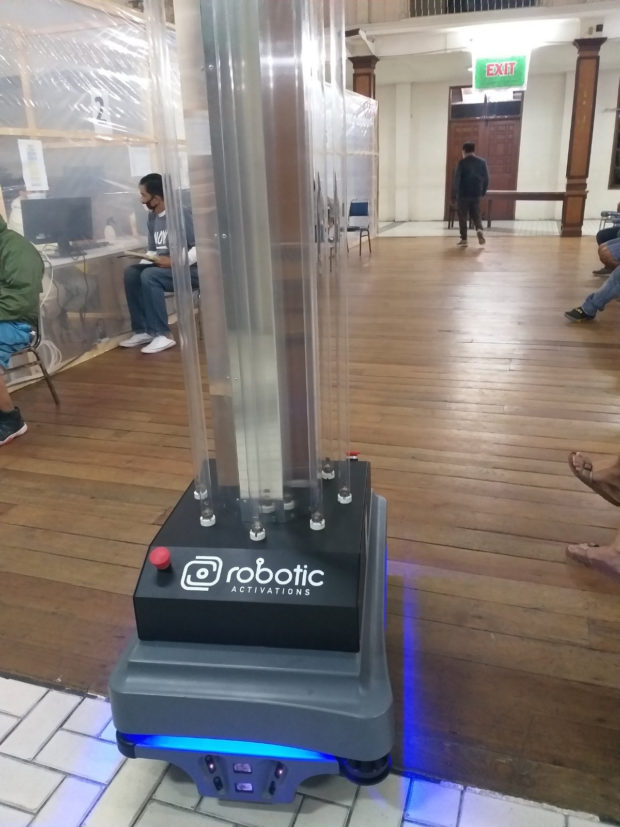Robots help disinfect Baguio’s coronavirus isolation centers

‘ROBOMAID’ A robot designed to sanitize rooms using ultraviolet rays is tested at Baguio City’s Teachers’ Camp to reduce the risk of infecting health workers. —CONTRIBUTED PHOTO
BAGUIO CITY, Benguet, Philippines — Sanitizing chemicals drenched the halls of the former Sto. Niño Hospital here where close to 300 patients afflicted with the new coronavirus disease (COVID-19) were being treated since the pandemic began in March.
But the regular disinfection last week was done by a robot, which was being tested by the city government.
Elsewhere in the building, three robot nurses were used to remotely monitor the condition of patients or deliver medicine.
Automation is becoming one of the key features of Baguio City’s health system as it works to keep down the spread of the disease.
Sto. Niño Hospital had been idle for the past 15 years, but its owners offered it to the city government for free after the Luzon lockdown, said Dr. Willie Occidental, who was tasked with overseeing the facility.
Article continues after this advertisementThe hospital was affiliated with the College of Nursing of Baguio Central University, but financial problems forced it to close in 2009.
Article continues after this advertisementBackup isolation rooms
It provided backup isolation quarters at the start of the lockdown, but the city government poured in millions of pesos to convert it into a 90-bed center for patients with mild COVID-19 symptoms.
The government is expanding the bed capacity to 250 and plans to equip it with 400 more by the end of the year to meet Baguio’s isolation room needs.
“With a small staff, we want to make sure everything is sanitized and everyone can take care of patients with limited contact,” Occidental said.
The three robot nurses are remote-controlled Logistic Indoor Service Assistants (Lisa), which were among four units donated in August by alumni of Saint Louis University. Each robot nurse rolls to a patient’s bed with a tray of assigned medicines.
The sanitation robot belongs to Robotic Activations Inc. and has been undertaking a test-run since last week.
An automation solutions company specializing in collaborative robots and autonomous mobile robots, Robotic Activations offered to sanitize any facility of Baguio’s choice using a “Keno UV-C Robot,” an industrial-grade disinfection robot.
Intensified health system
In a letter to Mayor Benjamin Magalong, Camille Anton-Mendoza, Robotic Activations’ chief of business development, said the robot designed in Denmark was harnessing the “germicidal power of UV-C radiation … for large-area disinfection,” and can “kill up to 99 percent of pathogens in the air and surfaces, including SARS-CoV-2.”
The Sto. Niño Hospital, the century-old Teachers’ Camp and the triage at Baguio Convention Center are part of the intensified health and isolation system in the city.
So far, 455 patients afflicted with the coronavirus have been treated at city hospitals like Baguio General Hospital and Medical Center.
The Baguio Convention Center is being equipped with medical triage facilities and isolation rooms to serve as a central hub for testing visitors.
It takes over the temporary triage at the St. Vincent Church gymnasium on Naguilian Road, which has processed 38,000 people since May.
—Vincent Cabreza
For more news about the novel coronavirus click here.
What you need to know about Coronavirus.
For more information on COVID-19, call the DOH Hotline: (02) 86517800 local 1149/1150.
The Inquirer Foundation supports our healthcare frontliners and is still accepting cash donations to be deposited at Banco de Oro (BDO) current account #007960018860 or donate through PayMaya using this link.